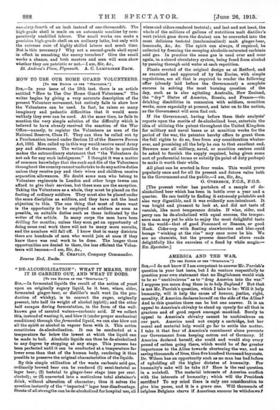DE-A_LCOHOLIZATION": WHAT IT MEANS, HOW IT IS CARRIED OUT, AND
WHAT IT DOES. [To 1118 Bruns or en "Srscraxox."1
Sic—In fermented liquids the result of the action of yeast upon an originally sugary liquid, be it beer, wines, cider, fermented ginger-beer, or distiller's malt wort (in the pro- duction of whisky), is to convert the sugar, originally present, into half its weight of alcohol (spirit); and the other half escapes during fermentation, in the form of the well- known gas of aerated waters—carbonic acid. If we collect this, instead of wasting it, and blow it (under proper mechanical conditions) through the fermented liquid, we can also blow out all the spirit or alcohol in vapour form with it. This action constitutes de-alcoholization. It can be conducted at a temperature far below the lowest at which the liquid can be made to boil. Alcoholic liquids can thus be de-alcoholized to any degree by stopping at any stage. This process has been perfected until it can be conducted at a temperature far lower even than that of the human body, rendering it thus possible to preserve the original characteristics of the liquids. By this simple ntilization of the waste carbonic acid gas, ordinarily brewed beer can be rendered (1) semi-teetotal as lager beer; (2) teetotal to ginger-beer stage (one per cent. alcohol); or (3) converted into a meticulous total abstainer's drink, without alteration of character ; thus it solves the question instantly of the "imported" lager beer disadvantage. Stouts of all strengths can be de-alcoholized f or hospital use, all wines and ciders rendered teetotal; and last and not least, the whole of the millions of gallons of nutritious malt distiller's wort (which goes down the drains) can be converted into the most delicious teetotal (unchemicalized) malt ginger-beer, lemonade, &c., dm. The spirit can always, if required, be collected by freezing the escaping alcoholic-saturated carbonic acid gas. In practice the same gas is used over and over again, in a closed circulatory system, being freed from alcohol by passing through cold water at each repetition.
Plants erected of the original design as at Retford, and as examined and approved of by the Excise, with simple regulations, are all that is required to render the following offer (already laid before the Government) a complete success in solving the most burning question of the day, such as is also agitating Australia, New Zealand, the " dry " States of America, Russia, and France—vizr drinking disabilities in connexion with soldiers, munition works, more especially at present, and later on to the nation, as the Government will soon find out.
If the Government, having before them their analysts' reports upon the merits of de-alcoholized beer, entertain the idea of utilizing this patent throughout the United Kingdom for military and naval bases or at munition works for the period of the war, the patentee hereby offers to grant them the full rights to do so, free from any consideration whatso- ever, and promising all the help he can to that excellent end. Brewers near all military, naval, or munition centres could be asked to furnish the supply required, being given some sort of preferential terms or subsidy (in point of duty perhaps) to make it worth their while.
All plant can be erected in four weeks. This would prove popularly once and for all its present and future value both to the Government and the public.—I am, Sir, rfre.,
0. OVERBECK, F.C.S.. F.G.S.
[The present writer has partaken of a sample of de. althholized beer which has been in bottle over a year and a quarter. He can testify to finding it extremely palatable and also very digestible, and it was evidently non-intoxicant. It was bright and pleasant to look at, and did not taste of varnish, like most temperance drinks. If wine, cider, and perry can be de-alcoholized with equal success, the temper. anus man may yet be able to enjoy the moat delightful taste in the world—that of good Pommard or Beaune, or good Hock. Cider-cup with floating strawberries and blue-eyed borne "winking at the rim" may once more be his. We are no chemists, lint the process described above reads delightfully like the exorcism of a fiend by white magic.— En. Spectator.]














































 Previous page
Previous page